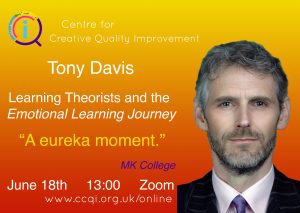Are Connectivists the People’s Front of Judea?

I do like an enigmatic title..
Do you remember studying the Learning Theorists as part of your teaching qualification? I have to admit, that by the time I’d handed in my assignment for my Cert Ed back in 1992, I’d had quite enough of them. I just wanted to crack on with learning how to teach. I’ve no doubt that some of it influenced me profoundly, but some of it left me cold, and some of it made me angry. Actually, quite a lot of it made me angry.
I particularly remember the phrase: ‘Zones of proximal development’. I know this says much about me and much less about Vygotsky, but phrases like this remind me of the year-8 playground and the kid who comes up with a new word then laughs at you because you have to ask what it means. Language that ‘excludes’ isn’t something I warm to.
And then there’s the bitchiness (forgive me), whether from the theorists themselves or the commentators on learning theory. Do you know what I mean? Successive theorists saying that they’re right and those that went before are wrong. I know I’m generalising, but reading about the Connectivists saying that they’re absolutely not Social Constructivists reminded me too much of that scene in The Life of Brian where the People’s Front of Judea are calling out the Judean People’s Front (or was it the other way round?)
But a few months ago, with the help of some very bright people from my LinkedIn Research Community, I worked hard to produce an alternative view of this subject, and invented my grandly titled Unified Theory of Learning in the process. On Friday June 18th at 1pm I’ll be running a session based on this work.
Here’s the broad brushstroke: all the Learning Theorists are right – when the conditions require their theory.
To put a bit more flesh on the bones: teachers do ‘stuff’. While we do our ‘stuff’, learners go on an Emotional Learning Journey. These Emotional Learning Journeys may or may not be linked to the ‘stuff’ we do. Further, these emotions are on a continuum from very positive to very negative; from, say, craving learning to anxiety or ambivalence. The art of teaching is to select the right teaching strategy to either ‘produce’ the positive Emotional Learning States, or ‘overcome’ the challenging ones. If we don’t, we’ve lost.
When looked at in this way, the work of the theorists becomes not just a toolkit, but a wonderful sweetshop of goodies to choose from. In the session on Friday, delegates will use a very inventive approach to dipping into that bag of sweets.
Taught through online gamification, delegates will be introduced to 50 stereotypical examples of pedagogy covering Behaviourism, Cognitivism, Social Constructivism and Connectivism. There’s even a few Humanist examples too. As the games progress, players will compete by arguing who has the best strategy to either produce a positive Emotional Learning State or overcome a challenging one. This really makes you see learning theory differently, and, rather unashamedly, it’s also a lot of fun.
If you like the sound of this, then do please join us on Friday afternoon, June 18th at 1pm. Or do please share this post with anyone you feel may be interested. There’s a place for everyone, whatever part of Judea you’re from.
Booking information and learning outcomes can be found here: www.ccqi.org.uk/learningtheory
Thank you, as ever, for taking the time.
Best wishes
Tony
PS Here are some lovely words from some very kind people:
- If I am honest, I have always had a downer on Behaviourism, but today I have noticed that it has many benefits and all theories have a place. It is the thing we hope to change, the level of learners and what they need to learn that can influence our choice and we shouldn’t just stick with one theory. Having knowledge of the underpinning theory alongside the emotional learning states can help us to select the best approach. Locating the position our learners are at and where they need to be is a great tool and provides an excellent starting point to develop effective teaching and learning.
- Having the material beforehand was really useful because we could do some pre-learning / reading. Clear instructions were given for the game.
- It’s not about planning lessons, but it is about planning experiences.
- That workshop was a game-changer for me.
- It’s not about planning lessons, but it is about planning experiences.
- That workshop was a game-changer for me.




Comments
No comments yet